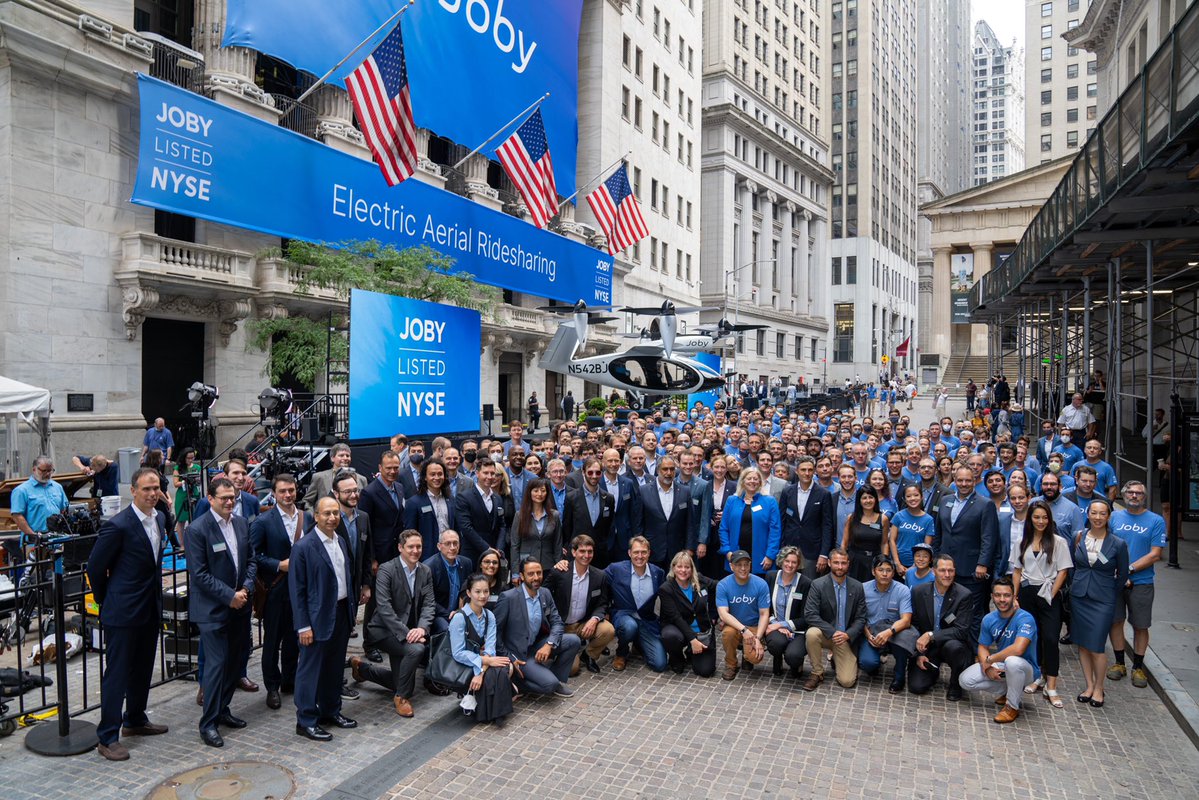Click Here to View This Page on Production Frontend
Click Here to Export Node Content
Click Here to View Printer-Friendly Version (Raw Backend)
Note: front-end display has links to styled print versions.
Content Node ID: 419153
Joby Aviation has become the first U.S.-based eVTOL aircraft developer to go public with a flotation on the New York Stock Exchange (NYSE). The share flotation under the symbol JOBY happened on August 11, just under a week after an extraordinary general meeting approved the California-based start-up’s merger with special purpose acquisition company Reinvent Technology Partners.
The fresh capital will support Joby’s plans to complete the type certification of a four-passenger all-electric eVTOL. The aircraft will have a single pilot, operating on routes of up to 150 miles and with a cruise speed of around 200 mph. The company transported one of its prototypes from California to New York to display it outside the NYSE building.
According to an investment memo published by Joby last month, the merger and flotation are expected to add a total of around $2 billion in cash to the company’s balance sheet, including $1.6 billion raised from the flotation plus cash on its balance sheet as of March 31, 2021. The company said this should more than cover the projected $1.4 billion cash flow requirement to take the aircraft to market entry, even allowing for possible certification delays. It says the transaction values the business at $4.5 billion.
Apart from China's EHang (see below), Joby is the first of the front-runners in the race to certify eVTOL aircraft to go public. Rivals Archer, Lilium, and Vertical Aerospace which are also in the process of merging with special purpose acquisition companies are expected to be joining the NYSE before the end of this year.
Today, Qell Acquisition Corp., which plans to merge with Lilium, announced that it will hold a special meeting of shareholders on September 10 to seek approval for the transaction. If approved, the merger is expected to be followed shortly by an NYSE flotation that is expected to raise around $830 million.
"By taking Joby public we have the opportunity to drive a renaissance in aviation, making emissions-free flight a part of everyday life," commented Joby founder and CEO JoeBen Bevirt. "This is our generation's moonshot moment, and at Joby we're proud to be leaning in."
Based on a projected investment payback in 2026, Joby says that after entering commercial service in 2024, each of its $1.3 million four-passenger aircraft will be generating annual net revenues of $2.2 million and net profits of $1 million. On this basis, total revenues in 2024 are projected to hit $2.05 billion, with gross profits of $1.18 billion and adjusted earnings of $824 million (representing a 40 percent EBITDA margin).
Joby Aviation's board includes Reinvent's co-lead director Reid Hoffman, who is co-founder of LinkedIn. "With its advanced technology, we believe Joby is 'Tesla meets Uber in the air' and the clear leader in the eVTOL and ridesharing space," he commented on the eve of the NYSE flotation. "We believe Joby is well-positioned with capital to be the first company to certification and commercialization. Closing this business combination accelerates Joby's roadmap, and we look forward to supporting JoeBen and Joby's world-class team in executing their vision."
Joby has already agreed on the basis for Part 23 type certification with the FAA and has been issued with the required G-1 documentation to start this process. As a partner in the U.S. Air Force’s Agility Prime research and development program, the company also has secured military airworthiness approval for its lift-and-cruise aircraft, which is already engaged in flight trials under the auspices of the Air Force’s AFWERX unit.
Since the company was founded in 2011, it has logged more than 1,000 flight hours with various iterations of its eVTOL design. In July, it conducted a 154-mile test flight, which Joby says is the longest ever flown by an eVTOL aircraft.
Prior to its agreement to merge with Reinvent Technology Partners, Japanese automotive group Toyota was one of Joby’s biggest financial backers. The carmaker will be providing practical support in preparation for scaled-up manufacturing of the still-unnamed eVTOL aircraft.
In the July investment memo, Joby indicated that it expects to have eVTOL air taxi services established in 20 U.S. cities with 750,000 or more people and more than 500 global cities with one million-plus population. Its assumption is that between 100 and 300 of its aircraft would be active in each location, generating potential revenues of up to $600 million per city and profits of up to $300 million. This is based on the assumption that each aircraft will fly seven hours per day on trips averaging 24 miles, with load factors of 2.3 passengers, seat-mile costs of $3, and a cost per available seat mile of 86 cents.
In December 2019, China-based eVTOL aircraft developer EHang launched an initial public offering on New York’s Nasdaq Global Market, raising less than half of the $100 million it had expected the flotation to yield. Throughout 2020, the stock price held up well, reaching a high of just under $130, only to drop by just over 60 percent to $46.31 in the wake of allegations by short-selling advocate Wolfpack Research that it had misrepresented multiple aspects of its business.
EHang firmly rebutted these claims and has since announced plans to start manufacturing its two-seat autonomous EH216 eVTOL aircraft and also develop a larger, longer-range model called the VT-30. On August 10, the company’s stock was trading at around $26 on the Nasdaq market.
